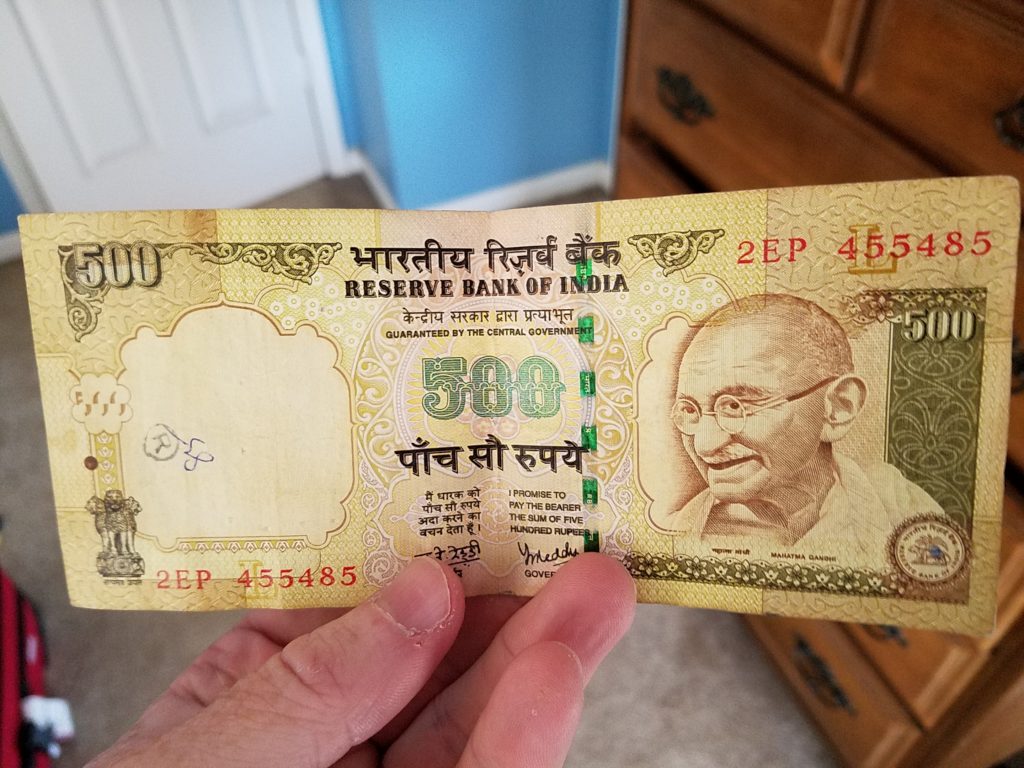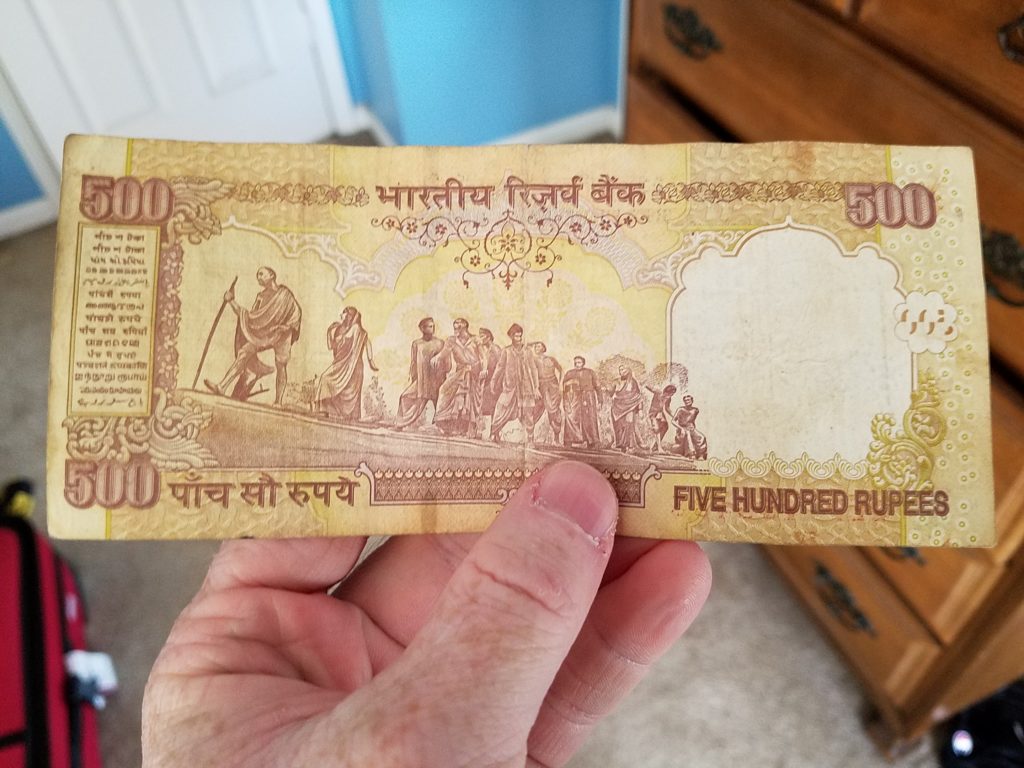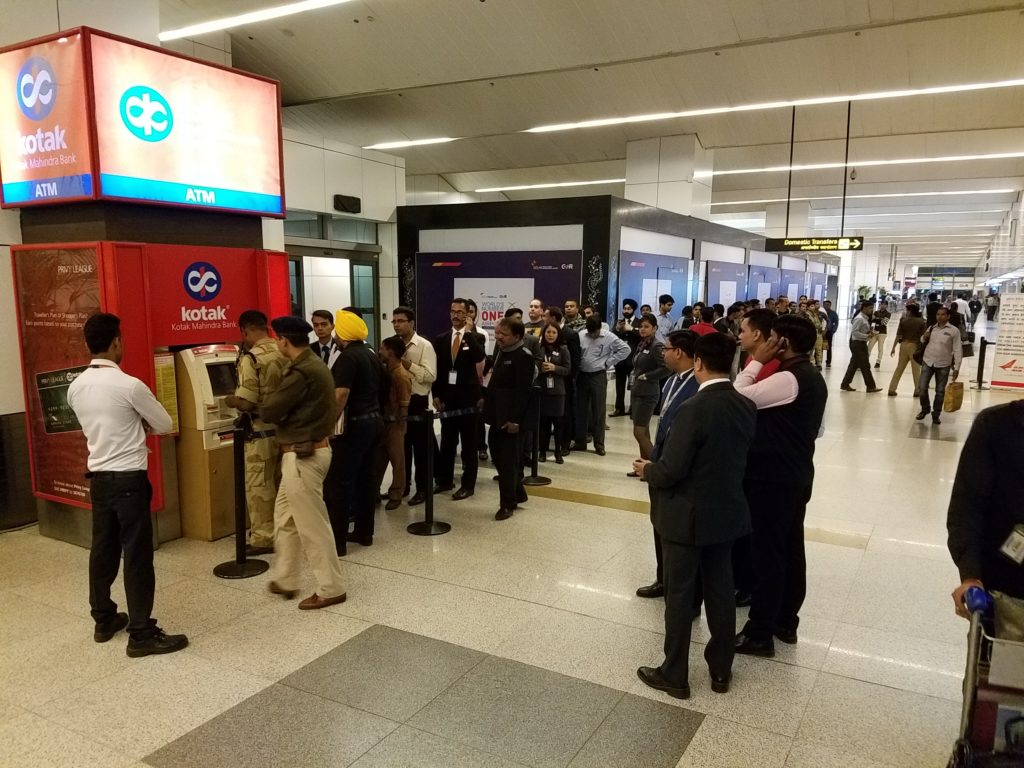“Black Money” and Old Testament Law
Hi Dojo readers,
As many of you know, I recently returned from my 4th teaching trip in India. You can see a few pics, as well as some of the reasons we go there each year over on my Senior Pastor Talbot Davis’ blog (which you should follow if you don’t already).
This year was different than any previous trip however.
You see, the day we landed in Delhi (or night…I can’t even remember because my mind loses all ability to track time across so many time zones for 30 hours with no sleep!) we went over to the currency exchange counter to exchange our U.S. dollars for Indian rupees, as usual. I handed the man around $200 USD and received a fairly thick stack of R500 notes in return. For those who don’t know, they look like this:


So far, so good. We took our currency, proceeded through customs, and prepared for our final flight from Delhi to Bhubaneshwar, the capital city of Odisha/Orissa state.
After arriving safely in Bhubaneshwar, we went to our good friends’ house for dinner (which, thanks to Anju’s cooking skills, was amazing as always!). While we were eating, P.R. got a call and turned on the television. We watched as the Indian news channels were going nuts with a breaking announcement: As of midnight that night, all R500 and R1000 currency notes would no longer be legal tender!
It was a surprise announcement by Prime Minister Modi’s office and the country was completely blindsided! All Indian banks would be closed the following day for 24 hours, and every Indian (over a billion of them!) would be required to either deposit or exchange their old notes for new ones within the next 15 days. As of midnight, however, no businesses would be able to legally accept the old notes as payment for any goods or services. Only airports, hospitals, train stations, and a few other essential industries would be allowed to accept the old notes during the 15 day period of transition.
We were quite alarmed. The conferences we were there to speak at were being paid for largely (we had planned) using the old notes, and none of us had the new notes. Furthermore, since government ID was required to exchange the old notes at a bank, and we were foreigners, we did not know if we’d be able to get ours exchanged at all. It was somewhat tense that evening as P.R. and the Conference organizers scrambled to figure out what we would do.
All we knew was that a law had been given from on high that just didn’t make any sense to us cash-using Americans, particularly as foreigners in a foreign land! It seemed that Prime Minister Modi (who has not always been the best friend of Christians or other religious minorities, by the way) was opposed to cash or just trying to make life hard on his people across that massive land for no good reason.
However…
As we watched the news and asked questions about the situation to our hosts, we soon discovered the reason for the Prime Minister’s unexpected executive decision. You see, India has had problems with massive corruption as well as terrorist groups, both of which operate largely through the use of what they call “Black Money.” Black Money is what we in America would call “under the table” money. Cash that is used without any paper trail or government knowledge. Large amounts of cash flow throughout the Indian economy and it is common for illegal or unethical deals to be done through the use of Black Money. Terrorist organizations fund terror through large cash amounts, primarily in the countries’s two largest denominations: R500 and R1000 notes. Businesses make corrupt, illegal, and untraceable deals worth fortunes using Black Money transactions. People report financial transactions at a certain rate, but then supplement them with large sums of unaccounted Black Money…thus avoiding paper trails, and taxes.
So, in an effort to fight this major problem in India, the government had new R2000 notes printed in secret and then made a surprise announcement that the old R500 and R1000 notes were now worthless as legal tender. The purpose of this move (whether it will turn out to have been a good idea or not remains to be seen!) was not simply to make Indians’ life miserable. Nor was it because the Prime Minister has a personal grudge against cash notes. Rather, it was to force the entire country to legally account for, deposit, and/or exchange all of their cash reserves so that Black Money would effectively be useless if not legally declared and accounted for…and of course taxed eventually!
So our entire trip was affected by this decision…because the entire country was affected by it. Here is what ATM lines looked like everywhere after the announcement was made, for those who may wonder what the big deal is. I took this pic in the Delhi airport on our way home:

But what does any of this have to do with the Old Testament? Well…quite a lot, actually.
You see, when we read the Old Testament, particularly the Old Testament laws found in Torah (the first five books of the Bible), we find ourselves in a position similar to how the team felt as we watched the news that night around the table. We are confused, disoriented, and don’t often know what to make of such seemingly arbitrary or arcane demands by Israel’s lawgiver, God. And based upon our disposition toward this God we read about, we either give Him the benefit of the doubt concerning the laws of His we don’t understand, or we condemn Him as a barbaric, maniacal, bloodthirsty, genocidal, arbitrary demagogue created by ignorant desert-dwellers in order to keep people in bondage to fear and therefore in line with the ruling class of priests.
Yet, as with the case of Indian Black Money, knowing the background to the various laws found in the Old Testament can often shed tremendous light on them and the reasoning behind them. Once we put ourselves back into the world of 2nd millennium Israel encamped around the base of Mt. Sinai or on the plains of Moab, we start to see that the laws God gave his people have a remarkable concern overall for the poor, the marginalized, and the oppressed. They elevated people above property, and began to introduce a redemptive trajectory that, while temporary and only in effect so long as the Sinai Covenant remained in effect, would find their greater fulfillment in the life, death, resurrection, and Gospel ethic of the Messiah…and their ultimate culmination in the New Heavens and New Earth which the Prophets and Jesus Himself pointed us toward. Even the seeming bizarre food laws take on new meaning when put into the overall context of the Covenant at Sinai. [For more examples of this principle on a weekly basis, be sure to subscribe and listen to the Disciple Dojo podcast or follow along on our YouTube channel as we journey through the books of Torah together on a weekly basis.]
So next time you come across a law or commandment in the Old Testament, think about our initial confusion over our newly-illegal stack of rupee notes and then look for that piece of background context which might shed a little more light on the subject. If you are looking for a good place to start, I cannot recommend strongly enough THIS resource by who I consider the greatest living OT scholar on the planet, personally.
Blessings from the Dojo,
JM
Categories: Biblical Theology, Blog, Global, Hebrew Bible, Ministry, Political/Social issues
your art is beautiful – it radiates which passion and thoughtfulness.
Your story – reminds: “there is nothing new under the sun”.
Thank you brother . A great way to share biblical principles . A great way to help point people to… The Word . Godspeed : )
by frank on Jan 10, 2021 at 9:17 pm